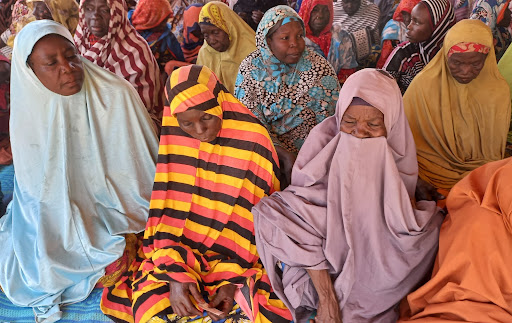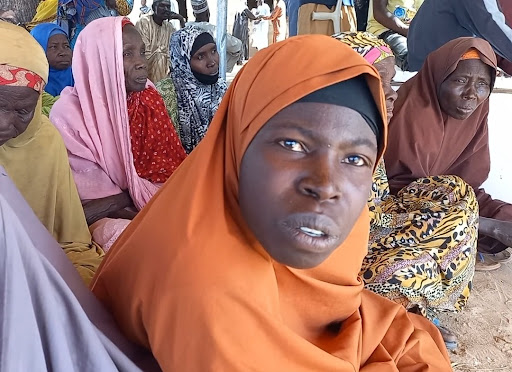Severe Hunger Pushing Borno IDPs To Consider Returning To War-torn Areas
Humanitarian assistance has generally been discontinued at the Gubio camp and several other sites, worsening starvation, sexual harassment, and forcing IDPs to consider resettling to their home communities, however unsafe it may be.

Fifty women sat under a neem tree at the Gubio camp for internally displaced persons (IDP) in Maiduguri, Northeast Nigeria, wearing sad expressions. It is not common for the displaced women to gather in such a manner except on two occasions: a newborn child’s naming ceremony or a funeral gathering. This assembly was because of neither of those reasons. The women had gathered not to celebrate a new life or mourn the departure of a loved one, but out of expectation.
A professional body, the Chartered Institute of Taxation in Nigeria (CITN), had on Monday, Feb. 7, donated food and cash to the displaced people in Borno. The State Emergency Management Agency (SEMA), which supervises such distributions, had chosen the IDPs in Gubio Camp as the beneficiaries. A hundred bags of rice and 25 litres of cooking oil of the same quantity were to be shared with selected beneficiaries alongside a cash donation of half a million naira.
Seated on the opposite side of the women was a similar assembly of 50 male IDPs, also selected to receive the relief items.
HumAngle was informed that the CITN support was the first of its kind the IDPs would be receiving in a long time.
According to the IDPs, the Gubio camp, which hosts people from Gubio, Kukawa, Dikwa, Gamboru-Ngala, Gwoza, Bama, Konduga, Marte, Jere, and Kala-Balge, has been shut out of all humanitarian support from both the government and non-profits for the past eight months.
The camp officially opened in May 2015 to accommodate Nigerian refugees returning from the Niger Republic through the Gaidam border town of Yobe State. When Baga was attacked that year, many of the residents had fled to the neighbouring country. Further attacks by the insurgents forced the refugees to move into Yobe, where the Nigerian government through the National Emergency Management Agency (NEMA) facilitated their return to Maiduguri.
The returnee-refugees, who were mostly farmers and fishermen, had since been living in the Gubio camp.
Between May 2015 and Dec. 2019, following the new surge of attacks and displacements, more IDPs, mostly women and children, arrived at the camp. According to records from the United Nations Office for the Coordination of Humanitarian Affairs (UNOCHA), as of 2020, the camp had a population of about 30,000 individuals and over 6,000 households.
The large population may have explained why the IDPs selected to benefit from the CITN donation on Monday didn’t see much reason to be excited. A selection of 100 persons out of a population of about 30,000 to benefit from a food donation may not only be uninspiring but also a recipe for the escalation of a simmering conflict.
Maryam Muhammad, who is her early 60s, said she fled her original home in Doron-Baga about seven years ago and she and her family have since grappled with hunger and lack.
“The last seven to eight months presented the most pathetic situation for us here in the camp,” she said.
“Since we arrived here, after a sojourn in the Niger Republic, it’s been years of torture and deprivation for most of us. We have not been given any food support and that has run into eight months now. The NGOs who usually provide food for us have stopped coming. We are supposed to be paid monthly stipends through POS vendors but they stopped that too.”
Maryam has four grandchildren under her care because some of their parents are late and others had risked returning to Doron-Baga to seek means of survival.
“In the last eight months that we didn’t get any form of support from the government or NGO, many people have died, especially children. Many mothers have mourned the deaths of their children; some elderly ones too have died and all are hunger-related deaths,” she said.
“People fall sick easily here and their ailments hardly respond to medication because the stomach is empty. No week passes by without a funeral rite here in this camp.
“As I am talking to you now, the last meal I had was yesterday morning. Even if you wanted to convert your lack of food to fasting, it does not make sense when at the end of the day you still have nothing to break the fasting with by the rites of Islam.”
HumAngle recently reported how some IDPs at the same camp said they have gone days without eating.
Zarah Aakura, 35, a mother of eight who fled her home in Gamboru-Ngala about five years ago, said she has not been able to cook any meal for her family for many days.
“We ran to Maiduguri because Boko Haram chased us out of our communities after destroying what we worked for all our lives, but here we are living a life worse than those who are even under Boko Haram captivity,” she said.
“Some of our husbands are in prison because they say they are Boko Haram suspects. Some were forcefully taken by Boko Haram because they refused to declare support for them, and we are left in the camp, alone, to cater for the children; with no food to feed them.”
“Let the government take us back to our communities since it can no longer provide for us. Going back to our villages may end this suffering because we are dying here… You don’t know what it means to watch your children crying for food every day and you have no idea where and how to even get them the food.”
“You can’t understand how tough it has been that even some of our fellow women would have to exchange their bodies for food to feed their children or watch men mess around with their daughters all in the name of survival,” Zarah added in tears.

Mairo Adamu, another aged woman, said the camp recorded more deaths at the peak of the dry season last.
“We are in a dire state of need here. The stomach is aching and it could have been worse for us, but thank God for the cold harmattan season when dehydration is minimal,” she observed.
“Initially, we were all scared of returning to Baga because of insecurity, but what the present state of hunger in this camp is doing to us is worse than what we even fear about Boko Haram’s hostility.
“We would forever remain grateful even if Governor Babagana Zulum can kindly support us with a means of transport to return to Baga before the cold season ends so that we can pick the pieces of our lives there.”
The Borno government had last year declared a general closure of IDP camps in the state capital, Maiduguri, scheduling for this to take place by the end of Dec. 2021. But this commitment could not be realised. Though many of the camps have been closed, the major ones like Muna Albadewi, Gubio, and Dalori camps remain open.
Yabawa Kolo, the Director General of SEMA, explained that the December deadline could not be realised “because of some insecurity-related challenges.”
Meanwhile, life at the camps have become significantly more unbearable. Most of the women from the Gubio camp who spoke to HumAngle said they had to resort to begging and all kinds of menial jobs. They visit already harvested farms to scavenge for neglected produce like groundnut and beans or to pick wood to sell.
“But the bushes are no longer safe now,” one IDP said. “We eat cucumbers and pepper most of the day because that’s affordable even though it leaves the children hungrier. We don’t like it but we have to let our girls go to houses in nearby host communities to do menial jobs. Sometimes we have to shut our eyes and ears to some of the unsavoury experiences they go through.”
“This is killing us gradually and we feel compelled to leave and go back to our villages; it no longer matters if the hinterlands are safer or not. At least one would regain his or her liberty and dignity; because death is better than the abuse we suffer here,” said Mairo.
Support Our Journalism
There are millions of ordinary people affected by conflict in Africa whose stories are missing in the mainstream media. HumAngle is determined to tell those challenging and under-reported stories, hoping that the people impacted by these conflicts will find the safety and security they deserve.
To ensure that we continue to provide public service coverage, we have a small favour to ask you. We want you to be part of our journalistic endeavour by contributing a token to us.
Your donation will further promote a robust, free, and independent media.
Donate HereStay Closer To The Stories That Matter




